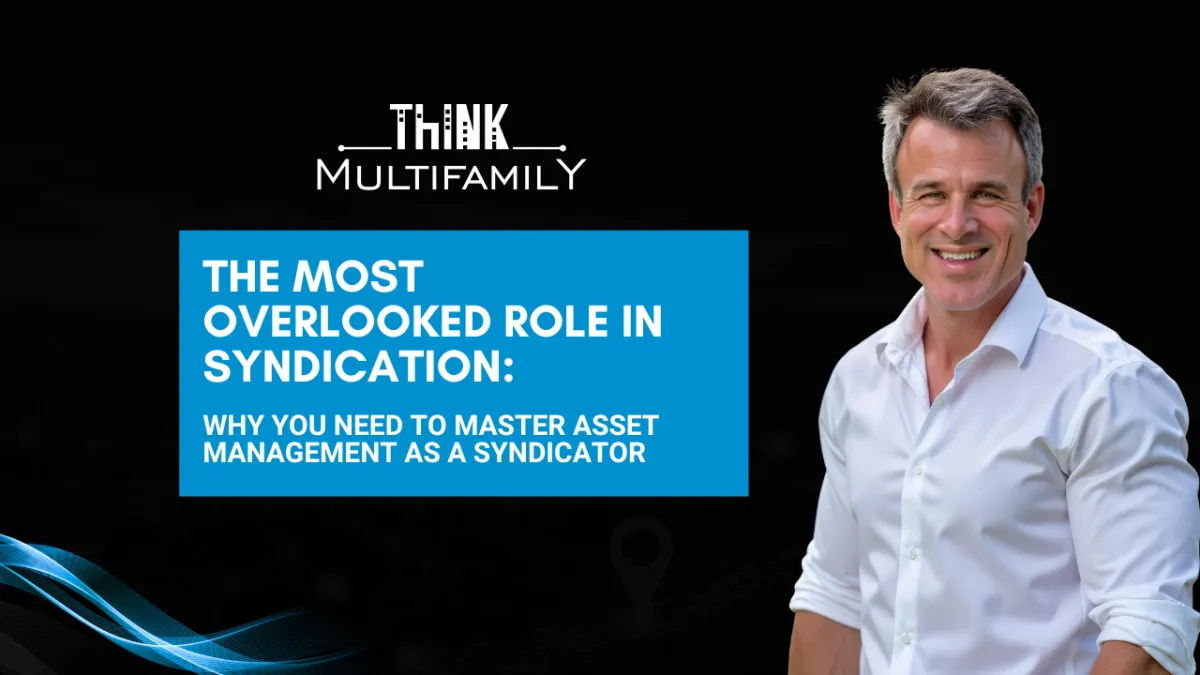
The Most Overlooked Role in Syndication: Why You Need to Master Asset Management As a Syndicator
By Mark Kenney | Think Multifamily
Too many syndicators obsess over getting to the close... and forget the part where they’re actually supposed to run the deal.
That’s where Asset Management separates amateurs from professionals.
You can be great at networking, raising capital, and presenting at meetups — but if you can’t operate, you won’t last.
If you're a GP, here's why you need to get serious about this role — and how to sharpen your execution before the next deal implodes.
Why Asset Management Is the Real Game-Changer
Forget “set it and forget it.”
The real work starts after the confetti settles from closing day.
The Best Asset Managers:
🟦 Track detailed financials — weekly, not quarterly
🟦 Drive CapEx execution with ruthless efficiency
🟦 Control budgets and revise pro formas based on market realities
🟦 Lead with data, not emotion — especially with property managers
🟦 Keep investors informed, not guessing
And here’s what most syndicators do instead:
Trust the property manager to “handle it”
Look at financials once a quarter
Avoid tough calls with vendors or GPs
Push off hard decisions until the lender comes knocking
Sound familiar? That’s not asset management. That’s gambling.
Behind-the-Scenes: How Deals Fail Without Asset Management
We’ve been brought in to consult on deals where:
Renovations stalled for 5 months because the GC ghosted and no one noticed
CapEx was $300K over budget — and no one could explain where it went
Occupancy dropped to 78% because leasing agents were unmonitored
A lender flagged the deal for cash flow violations two quarters in a row
Investors started calling us, not the operator, asking what was happening
📌 These weren’t “bad” operators. They just didn’t realize owning a deal is not the same as managing it.
The Cost of Sloppy Asset Management
Here’s what happens when asset management is an afterthought:
❌ Overbudget CapEx
❌ Missed rent increases
❌ Poor tenant retention
❌ Breached loan covenants
❌ Disappointed investors
❌ Burned-out GPs scrambling to save face
You may survive the first deal.
But if you plan to scale — or want repeat investors — this won’t cut it.
What to Track (Every Week)
Your AM scorecard should include:
→ Occupancy & pre-leased %
→ Collections & delinquencies
→ CapEx progress vs. timeline
→ Actual vs. budget
→ Net operating income (NOI) trends
→ Concessions, renewals, and economic vacancy
→ Investor distributions vs. projections
→ On-site team performance
Bottom line: If you’re not watching it, it’s already slipping.
Want to Fix This? Use a System.
The best operators don’t rely on instinct. They run plays.
They have weekly AM meetings, scorecards, dashboards, escalation processes, and deal reviews.
They act like CEOs — not passive landlords.
Free Asset Management Playbook
Want to level up your operations and stop flying blind?
👉 Grab our free guide: The Guard Dog’s Guide to Asset Management
Inside you'll find:
→ The Do’s and Don’ts of Asset Management every operator should know
→ Real-world strategies to boost NOI and property value fast
→ Warning signs your property manager isn’t performing — and what to do next
📩 Download Asset Management Guide
Final Takeaway for GPs
You can’t outsource responsibility for your deal’s performance.
If you want:
✔️ Investor referrals
✔️ Refinance options
✔️ Broker relationships
✔️ Long-term credibility
...you need asset management systems.
At Think Multifamily, we don’t “hope” deals work out.
We manage like it’s our own money — because it is.
It’s time more operators adopted that mindset.
Ready to Get Serious About Asset Management?
If you know you're ready to operate like a pro and want expert guidance from someone who's managed 120+ multifamily deals...
👉 Apply for coaching today — and let’s hit the ground running.